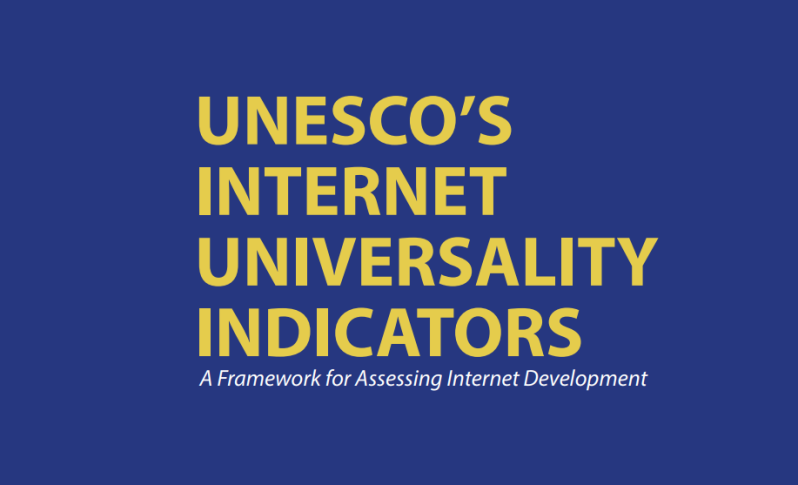
Republished from UNESCO website:
Having completed a two-year global multi-stakeholder consultation process on defining Internet Universality Indicators including one workshop discussion conducted at IGF 2017, UNESCO takes the occasion to present the final outcome of the indicators framework and engage further with IGF stakeholders on how to promote R.O.A.M principles (Rights, Openness, Accessibility, Multi-stakeholderism) in global internet governance and facilitate the application and implementation of these indicators at national levels.
The Internet Universality Indicators contain 303 quantitative, qualitative and institutional indicators (including 109 identified as core ones, and developed under 6 categories, 25 themes, and 124 questions), along with a list of identified sources and means of verifications. The indicators are structured around the four ROAM Principles around and aim to measure to what extent these principles are achieved at national levels, alongside Cross-Cutting Indicators which concern with gender and the needs of children and young people, sustainable development, trust and security, and legal and ethical aspects of the internet. A number of Contextual Indicators about demographic, social and economic characteristics of a country, are also proposed to help users to understand their findings and frame their recommendations in the most appropriate way for different countries.
This Open Forum will bring in various stakeholders from different regions and countries to reflect and exchange on how to use the Internet Universality Indicators as a comprehensive tool, to enrich the stakeholders’ capacity for assessing internet development, broaden international consensus, and foster online democracy and human rights towards post-2015 WSIS implementation and achieving 2030 Sustainable Development Goals.
UNESCO’s work to develop Internet Universality Indicators has been supported by the Swedish International Development Agency and the Internet Society. The Internet Universality Indicators have been developed through a process of desk research and global multistakeholder consultation online and offline, undertaken by UNESCO with the support of a consortium which has been led by the Association for Progressive Communications (APC) and includes ict Development Associates, LIRNEasia and Research ICT Africa.
The draft indicators (to be finalised in November 2018) are available on the project website: https://en.unesco.org/internetuniversality
This event will also be an opportunity for UNESCO to launch its new curriculum “Journalism, Fake news and Misinformation: Model Course for Journalism Educators and Trainers”. This model curriculum is designed to give journalism educators and trainers a framework and lessons to help students of journalism and practitioners to navigate the emerging global problem of disinformation. It can be found online at https://en.unesco.org/fightfakenews
When, local time: Tuesday, 13 November 2018 - 4:10 pm to 5:10 pm
Where: France, Paris
Type of Event: Category 7-Seminar and Workshop
Contact: Xianhong Hu (Email: x.hu@unesco.org)